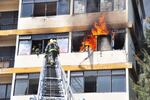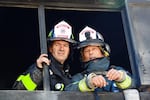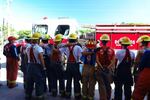
Firefighters participate in a high-rise firefighting training in Latin America in 2012.
Courtesy of José Troncoso
In 1999, José Troncoso had an idea.
It came while the veteran Portland firefighter was in Guadalajara, Mexico. The capital of the Mexican state of Jalisco, Guadalajara has been one of Portland’s sister cities since 1983. As part of that sister-city relationship, Portland was donating a fire engine to the Guadalajara Fire Department at the time. Then Portland Fire & Rescue Chief Ed Wilson asked Troncoso, who is Mexican American and bilingual, to accompany him to Mexico as a translator.
As part of their visit, Wilson and Troncoso got to tour Guadalajara's fire stations and observe the Mexican bomberos — firefighters, in Spanish — at work.
“We noticed that their equipment was way behind ours, and that they were doing some techniques that we had long ago abandoned, being that they were unsafe,” Troncoso told OPB’s Weekend Edition.
It got him thinking about what he and other firefighters could do to help. On the flight home, Troncoso drafted what he called a “grandiose plan.” He’d collect equipment to donate to Guadalajara’s fire department, and then update the department’s training with the latest fire and rescue techniques, translated into Spanish and tailored to the needs of the region.
“I was very surprised that Chief Wilson loved the idea, and said he would give me anything necessary to make my dream a reality,” Troncoso said.
That was 20 years ago. Today, his dream lives in the form of the nonprofit he founded, Bomberos Latinos, which works in partnership with the Portland Guadalajara Sister City Association. With Troncoso at the helm, Spanish-speaking firefighters from across the U.S. have participated in 60 international training trips, not just to Mexico, but throughout Latin America.

Lieutenant José Troncoso helps lead a Bomberos Latinos training in Guadalajara, MX in 2018.
Courtesy of José Troncoso
In the program’s infancy, Troncoso traveled to Guadalajara to assess the equipment inventory at every fire station. He opened every fire engine and ladder truck.
“The next thing we had to do is look at the world in which they live,” Troncoso said.
Just as it wouldn't make sense to train the Guadalajaran bomberos on equipment they couldn't use, it wouldn't make sense to train them to work in conditions that didn't apply to the region.
“For instance, here in Portland, we have hydrants on every corner. We have unlimited water. In Guadalajara, and basically throughout all Latin America, there are essentially no fire hydrants. So they bring the water in a tanker.” When it runs out, they bring a new tanker and switch the supply lines, Troncoso said.
Not only the infrastructure, but the construction of buildings is different in Latin America. For example, in the United States, many homes are wood-framed and have pitched roofs. During a fire, firefighters often go onto the roof and cut a hole with a chainsaw, to help the heat and smoke vent out of the building. But in Latin America, many residences have flat roofs made of concrete, impossible to cut through with chainsaws.
“So we had to not only translate the language of our training, but also adapt it so that it applies to them,” Troncoso said.
After a few years of successful trainings in Guadalajara, word got out about the sessions Troncoso was leading. Soon, he was fielding requests from other countries. While firefighting conditions in Mexico are different from those in the U.S., Troncoso said they’re largely universal throughout Latin America. That meant the Bomberos Latinos trainings developed for Guadalajara could easily be applied elsewhere in the region.
“They started contacting us, saying, ‘Hey, is there any way you could come down to Peru, down to Chile, down to Ecuador?’ So, we expanded and started going out there,” Troncoso said.

Lieutenant José Troncoso pictured (right) alongside New York City Fire Department Battalion Chief Danny Sheridan at a training in 2017.
Courtesy of José Troncoso
Bomberos Latinos' website lists training topics including rapid intervention, high-angled rescue, wildland firefighting, incident command, hazardous materials and more. Donations have included a thermal imaging camera, radiation detection equipment, a fire engine and ladder truck, and — crucially, said Troncoso — air packs.
“The most important tool a firefighter has are the air packs that we wear. We’re going into rooms full of smoke, full of fire, elevated temperatures … most people who die as a result of a fire die from inhaling the smoke, not from burns,” Troncoso said.
Almost none of the departments Bomberos Latinos have worked with had air packs. So Troncoso gathered donated air packs, delivered them and trained firefighters to use them.
“It was very rewarding for us to get notices from departments saying, ‘We went in a building, and we pulled a child out last night, and this child’s alive today,’ and they couldn’t have done that if they hadn’t actually had that equipment,” Troncoso said.
In addition to saving lives in the community, new equipment and training has saved the lives of firefighters themselves. In Guadalajara, several firefighters had died on the job in the years prior to Bomberos Latinos’ work with the city’s fire department. But in the 20 years since, Troncoso said, not one firefighter has died in the line of duty.
The Guadalajara Fire Department has also changed the way fire stations are distributed throughout the city, based on Portland’s model of fire service. In 1999, Guadalajara had only four fire stations citywide, to serve a population of millions.
“The reason here in Portland that we have 30 fire stations is, we try to keep to a response time of four or five minutes … because if someone is having a heart attack or if there’s a fire, those minutes are critical,” Troncoso said.
Bomberos Latinos suggested to department leadership in Guadalajara that they add smaller stations into more neighborhoods throughout the city.
“20 years later, Guadalajara now has 17 stations … and now their response time has been cut drastically, and they’re able to save a lot more lives,” Troncoso said.

Latin American bomberos gathered before a Guadalajara fire truck in 2017.
Courtesy of José Troncoso
In September 2017, Troncoso got to see some of the rescue personnel he'd trained leap into action. He was in Guadalajara on the 32nd anniversary of a massive earthquake that hit Mexico City in 1985. He'd just completed a training the day prior. On his free day in Guadalajara, he was invited to a simulation and earthquake drill taking place in the city, like others held across the country to mark the anniversary of 1985 'great quake.' During the simulation, Mexico City was hit with a real, 7.1 magnitude earthquake, powerful enough to be felt more than 300 miles away in Guadalajara. Troncoso said Guadalajara's urban search and rescue team, members of which he'd both trained and worked alongside, quickly departed and were some of the first boots on the ground in Mexico City. They spent over a week there doing rescue work in the aftermath of the quake.
Seeing the positive results of the trainings and donations he’s helped facilitate over the years has been gratifying for the Portland fire lieutenant. He spoke of how it fits into his broader role as a Latino firefighter, and as a Mexican American in particular.
“I grew up in East L.A. My father is from Mexico. He was a Spanish professor his entire life, until he retired. We grew up speaking only Spanish in the home, because my father knew we would pick up English … I’m forever indebted to my parents for raising us the way they did,” Troncoso said.
His bilingualism and the program he founded have taken him to 14 different countries, and on dozens of international training trips. Troncoso said he looks for ways to give back to the community, out of gratitude for the opportunities he’s been given in his own life.
“Just having the language open[ed] doors for me to be able to help other people,” he said.
Bomberos Latinos has three more trainings scheduled this year, and has received requests for 15 trainings in 2020. Troncoso wishes he had the time to fill all the requests they've received. But, he said, he’s looking forward to retiring in the not-so-distant future. After that, he’d like to step up his nonprofit work even more, with a goal of doing a training per month. The work brings him joy.
“I feel very enriched by the experiences of having gotten to know these people, my brother and sister firefighters throughout Latin America, and the experiences I have are unforgettable and a treasure to me.”
To listen to the full interview with Lt. José Troncoso, use the audio player at the top of this story.

